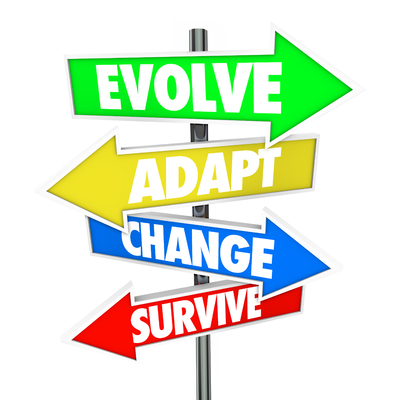
What if the ability to tell a good story made the difference between life and death of your entire species?
It does.
Most evolution drawings depict our species going from knuckle-dragging ape to hunched-over caveman to walking erect homo sapien. Recent evidence indicates the journey was less linear, and more competitive.
One hundred thousand years ago, there were six species of humans. Today there’s just one, us. The Homo sapiens. “Homo sapiens conquered the world thanks above all to its unique language,” says Yuval Noah Harari. Sapiens survived because they used stories to create shared belief.
In Sapiens: A Brief History of Humankind, he writes, “Many animals and humans could previously say, ‘Careful, a lion.’ Homo sapiens acquired the ability to say, “The lion is the guardian spirit animal of our tribe.”
Shared belief is what enables large groups of people to accomplish great things.
As Harari points out, “You’d never convince a money to give you a banana by promising him limitless bananas after death in monkey heaven.” Yet you can convince humans to give you their time and effort to build a cathedral or a company by promising future rewards like eternal life or stock options.
The human species that died out, could only communicate facts in the here and now. They could tell their tribe where the best berries were or how to kill a beast. Without the higher-level cognitive skill of storytelling, they couldn’t create shared belief.
Without shared belief, an organization is just a functioning pack of animals easily overtaken by a group whose members actually care. It took a few hundred thousand years for the Sapiens to come out on top, in today’s world evolution works much faster.
Imagine you run a bank. You teach your people how to do deposits, make loans, speak politely to customers, count the money, etc. Your management mantra is process and procedure; the modern version of here’s how to spear a wild boar. If everyone masters the skills, and the tribe has enough shared knowledge, you’re going to have an effective bank.
Now imagine the bank down the street does exactly the same things, but in addition to skills and knowledge, they focus on belief. They tell their team: We’re the bank that helps people navigate their financial future. We have a long rich history of helping clients. These past and current employees are our client service heroes who were driven to exceed client expectations. Instead of simply seeing themselves as processors, this team sees themselves as Noble Knights. We’re changing the world of banking. Our tribal ethos is caring for clients.
Which bank do you think will win the market?
When skills and knowledge are equal, the team with shared belief will win every time. Shared belief is what makes organizations like Apple, Nike, and The Ritz Carlton stand out from a sea of competitors. Shared belief is what propelled the Americans to fight and beat the British. It’s what enables one highly skilled team to beat another equally skilled team in sports. And it’s what propels family members to support and encourage each other during difficult times.
Organizations without shared belief can’t evolve; they’re like Neanderthals grunting to each other about the hunt. Shared belief drives behavior, it sparks innovation and creativity, and it safeguards morale during times of trouble.
Function and facts are required, process and procedure matter too. But they’re not enough. Your survival depends on your story.